Organisational Behaviour Report: Sports Direct Case Study Analysis
VerifiedAdded on 2021/01/03
|23
|7713
|81
Report
AI Summary
This report delves into the realm of organisational behaviour, using Sports Direct International Plc as a case study. It examines how organisational culture, politics, and power dynamics impact individual and team behaviour and performance, exploring models like Charles Handy's cultural framework and Hofstede's cultural dimensions. The report analyses various motivational theories and techniques, and discusses effective and ineffective team dynamics. It further applies concepts and philosophies of organisational behaviour to enhance team development, concluding with an evaluation of the interplay between culture, politics, and power within the organisational context. The report also explores the practical application of organisational behaviour principles to improve efficiency and overall organisational outcomes, with a focus on the role of leadership and management strategies.
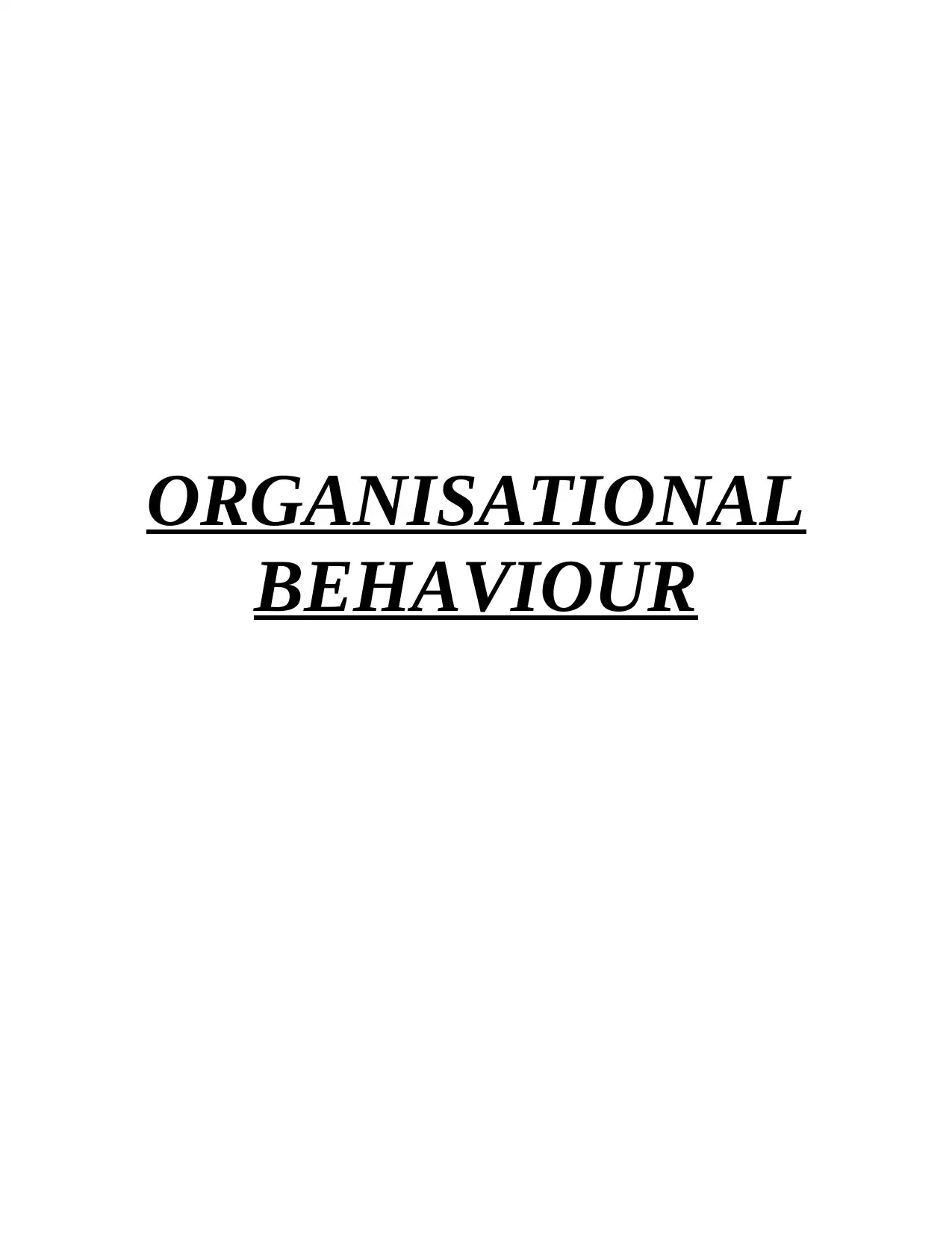
ORGANISATIONAL
BEHAVIOUR
BEHAVIOUR
Paraphrase This Document
Need a fresh take? Get an instant paraphrase of this document with our AI Paraphraser
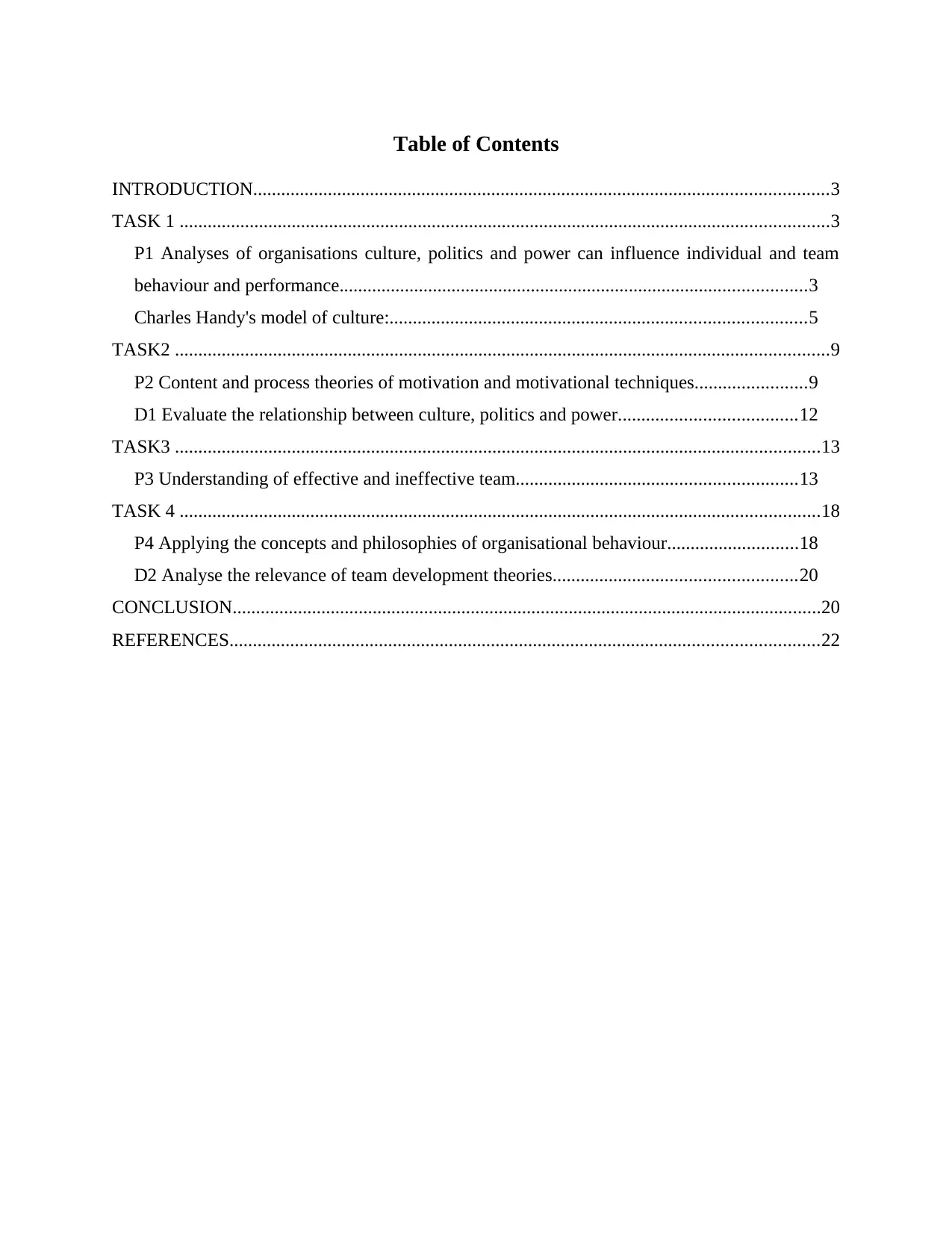
Table of Contents
INTRODUCTION...........................................................................................................................3
TASK 1 ...........................................................................................................................................3
P1 Analyses of organisations culture, politics and power can influence individual and team
behaviour and performance....................................................................................................3
Charles Handy's model of culture:.........................................................................................5
TASK2 ............................................................................................................................................9
P2 Content and process theories of motivation and motivational techniques........................9
D1 Evaluate the relationship between culture, politics and power......................................12
TASK3 ..........................................................................................................................................13
P3 Understanding of effective and ineffective team............................................................13
TASK 4 .........................................................................................................................................18
P4 Applying the concepts and philosophies of organisational behaviour............................18
D2 Analyse the relevance of team development theories....................................................20
CONCLUSION..............................................................................................................................20
REFERENCES..............................................................................................................................22
INTRODUCTION...........................................................................................................................3
TASK 1 ...........................................................................................................................................3
P1 Analyses of organisations culture, politics and power can influence individual and team
behaviour and performance....................................................................................................3
Charles Handy's model of culture:.........................................................................................5
TASK2 ............................................................................................................................................9
P2 Content and process theories of motivation and motivational techniques........................9
D1 Evaluate the relationship between culture, politics and power......................................12
TASK3 ..........................................................................................................................................13
P3 Understanding of effective and ineffective team............................................................13
TASK 4 .........................................................................................................................................18
P4 Applying the concepts and philosophies of organisational behaviour............................18
D2 Analyse the relevance of team development theories....................................................20
CONCLUSION..............................................................................................................................20
REFERENCES..............................................................................................................................22
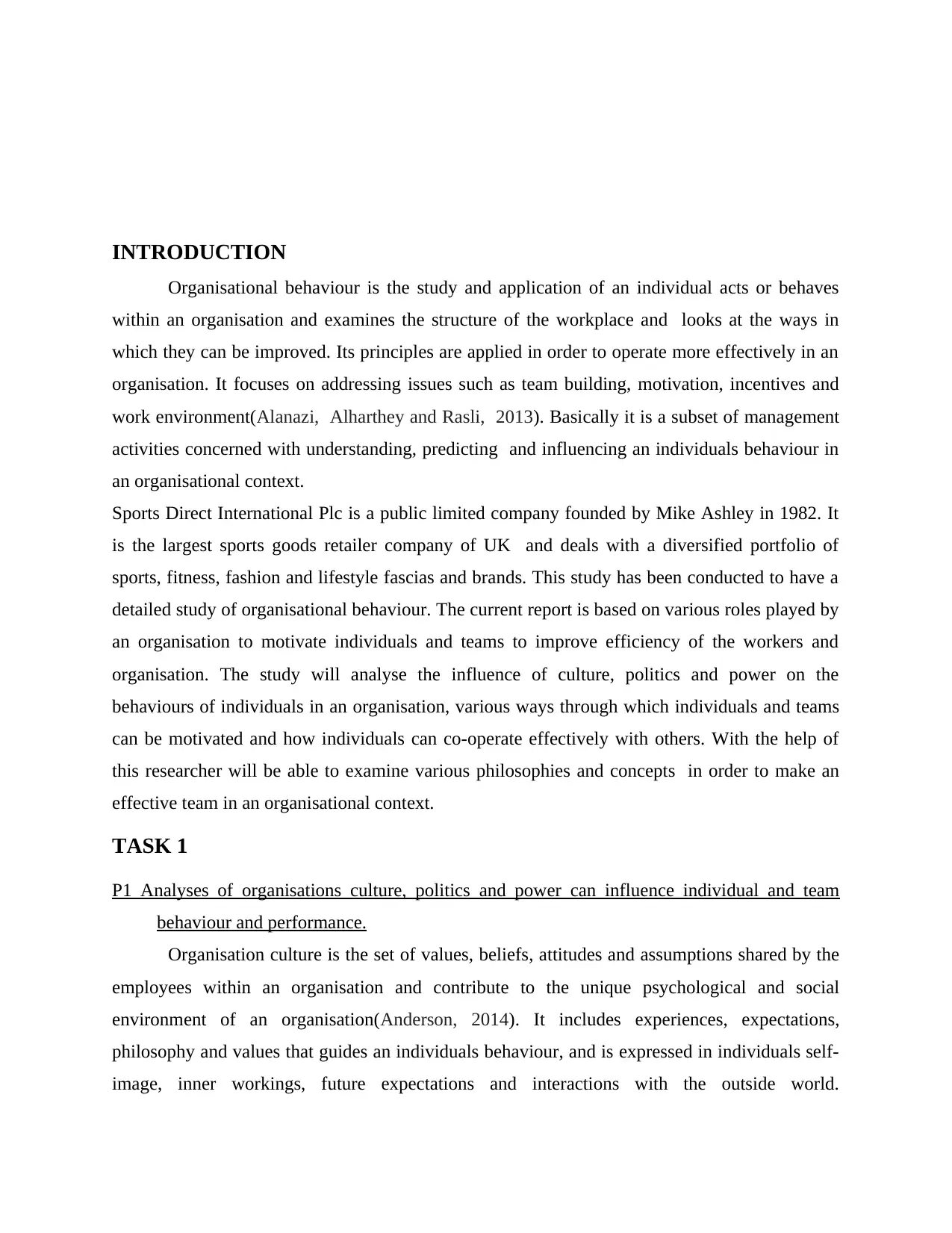
INTRODUCTION
Organisational behaviour is the study and application of an individual acts or behaves
within an organisation and examines the structure of the workplace and looks at the ways in
which they can be improved. Its principles are applied in order to operate more effectively in an
organisation. It focuses on addressing issues such as team building, motivation, incentives and
work environment(Alanazi, Alharthey and Rasli, 2013). Basically it is a subset of management
activities concerned with understanding, predicting and influencing an individuals behaviour in
an organisational context.
Sports Direct International Plc is a public limited company founded by Mike Ashley in 1982. It
is the largest sports goods retailer company of UK and deals with a diversified portfolio of
sports, fitness, fashion and lifestyle fascias and brands. This study has been conducted to have a
detailed study of organisational behaviour. The current report is based on various roles played by
an organisation to motivate individuals and teams to improve efficiency of the workers and
organisation. The study will analyse the influence of culture, politics and power on the
behaviours of individuals in an organisation, various ways through which individuals and teams
can be motivated and how individuals can co-operate effectively with others. With the help of
this researcher will be able to examine various philosophies and concepts in order to make an
effective team in an organisational context.
TASK 1
P1 Analyses of organisations culture, politics and power can influence individual and team
behaviour and performance.
Organisation culture is the set of values, beliefs, attitudes and assumptions shared by the
employees within an organisation and contribute to the unique psychological and social
environment of an organisation(Anderson, 2014). It includes experiences, expectations,
philosophy and values that guides an individuals behaviour, and is expressed in individuals self-
image, inner workings, future expectations and interactions with the outside world.
Organisational behaviour is the study and application of an individual acts or behaves
within an organisation and examines the structure of the workplace and looks at the ways in
which they can be improved. Its principles are applied in order to operate more effectively in an
organisation. It focuses on addressing issues such as team building, motivation, incentives and
work environment(Alanazi, Alharthey and Rasli, 2013). Basically it is a subset of management
activities concerned with understanding, predicting and influencing an individuals behaviour in
an organisational context.
Sports Direct International Plc is a public limited company founded by Mike Ashley in 1982. It
is the largest sports goods retailer company of UK and deals with a diversified portfolio of
sports, fitness, fashion and lifestyle fascias and brands. This study has been conducted to have a
detailed study of organisational behaviour. The current report is based on various roles played by
an organisation to motivate individuals and teams to improve efficiency of the workers and
organisation. The study will analyse the influence of culture, politics and power on the
behaviours of individuals in an organisation, various ways through which individuals and teams
can be motivated and how individuals can co-operate effectively with others. With the help of
this researcher will be able to examine various philosophies and concepts in order to make an
effective team in an organisational context.
TASK 1
P1 Analyses of organisations culture, politics and power can influence individual and team
behaviour and performance.
Organisation culture is the set of values, beliefs, attitudes and assumptions shared by the
employees within an organisation and contribute to the unique psychological and social
environment of an organisation(Anderson, 2014). It includes experiences, expectations,
philosophy and values that guides an individuals behaviour, and is expressed in individuals self-
image, inner workings, future expectations and interactions with the outside world.
⊘ This is a preview!⊘
Do you want full access?
Subscribe today to unlock all pages.

Trusted by 1+ million students worldwide
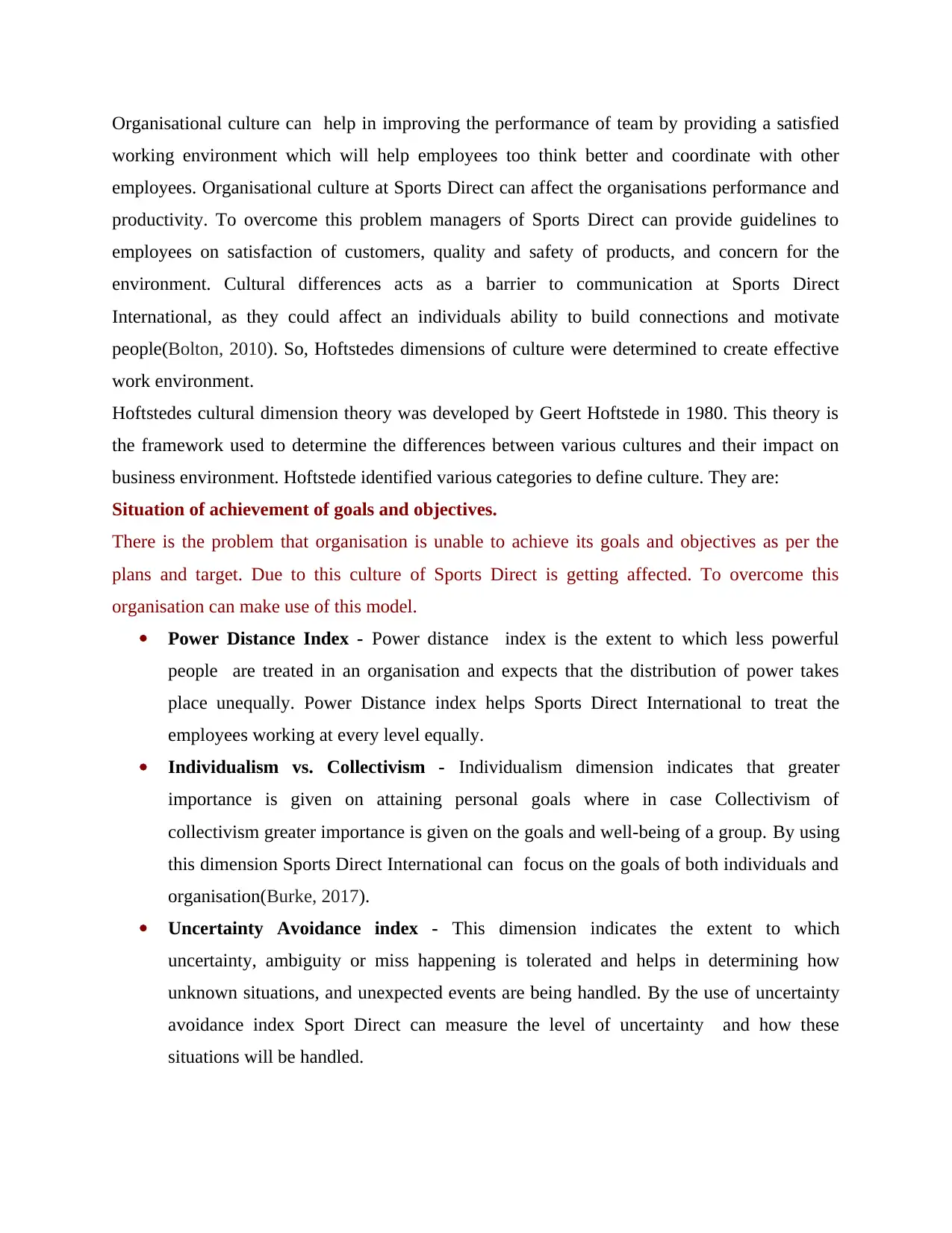
Organisational culture can help in improving the performance of team by providing a satisfied
working environment which will help employees too think better and coordinate with other
employees. Organisational culture at Sports Direct can affect the organisations performance and
productivity. To overcome this problem managers of Sports Direct can provide guidelines to
employees on satisfaction of customers, quality and safety of products, and concern for the
environment. Cultural differences acts as a barrier to communication at Sports Direct
International, as they could affect an individuals ability to build connections and motivate
people(Bolton, 2010). So, Hoftstedes dimensions of culture were determined to create effective
work environment.
Hoftstedes cultural dimension theory was developed by Geert Hoftstede in 1980. This theory is
the framework used to determine the differences between various cultures and their impact on
business environment. Hoftstede identified various categories to define culture. They are:
Situation of achievement of goals and objectives.
There is the problem that organisation is unable to achieve its goals and objectives as per the
plans and target. Due to this culture of Sports Direct is getting affected. To overcome this
organisation can make use of this model.
Power Distance Index - Power distance index is the extent to which less powerful
people are treated in an organisation and expects that the distribution of power takes
place unequally. Power Distance index helps Sports Direct International to treat the
employees working at every level equally.
Individualism vs. Collectivism - Individualism dimension indicates that greater
importance is given on attaining personal goals where in case Collectivism of
collectivism greater importance is given on the goals and well-being of a group. By using
this dimension Sports Direct International can focus on the goals of both individuals and
organisation(Burke, 2017).
Uncertainty Avoidance index - This dimension indicates the extent to which
uncertainty, ambiguity or miss happening is tolerated and helps in determining how
unknown situations, and unexpected events are being handled. By the use of uncertainty
avoidance index Sport Direct can measure the level of uncertainty and how these
situations will be handled.
working environment which will help employees too think better and coordinate with other
employees. Organisational culture at Sports Direct can affect the organisations performance and
productivity. To overcome this problem managers of Sports Direct can provide guidelines to
employees on satisfaction of customers, quality and safety of products, and concern for the
environment. Cultural differences acts as a barrier to communication at Sports Direct
International, as they could affect an individuals ability to build connections and motivate
people(Bolton, 2010). So, Hoftstedes dimensions of culture were determined to create effective
work environment.
Hoftstedes cultural dimension theory was developed by Geert Hoftstede in 1980. This theory is
the framework used to determine the differences between various cultures and their impact on
business environment. Hoftstede identified various categories to define culture. They are:
Situation of achievement of goals and objectives.
There is the problem that organisation is unable to achieve its goals and objectives as per the
plans and target. Due to this culture of Sports Direct is getting affected. To overcome this
organisation can make use of this model.
Power Distance Index - Power distance index is the extent to which less powerful
people are treated in an organisation and expects that the distribution of power takes
place unequally. Power Distance index helps Sports Direct International to treat the
employees working at every level equally.
Individualism vs. Collectivism - Individualism dimension indicates that greater
importance is given on attaining personal goals where in case Collectivism of
collectivism greater importance is given on the goals and well-being of a group. By using
this dimension Sports Direct International can focus on the goals of both individuals and
organisation(Burke, 2017).
Uncertainty Avoidance index - This dimension indicates the extent to which
uncertainty, ambiguity or miss happening is tolerated and helps in determining how
unknown situations, and unexpected events are being handled. By the use of uncertainty
avoidance index Sport Direct can measure the level of uncertainty and how these
situations will be handled.
Paraphrase This Document
Need a fresh take? Get an instant paraphrase of this document with our AI Paraphraser
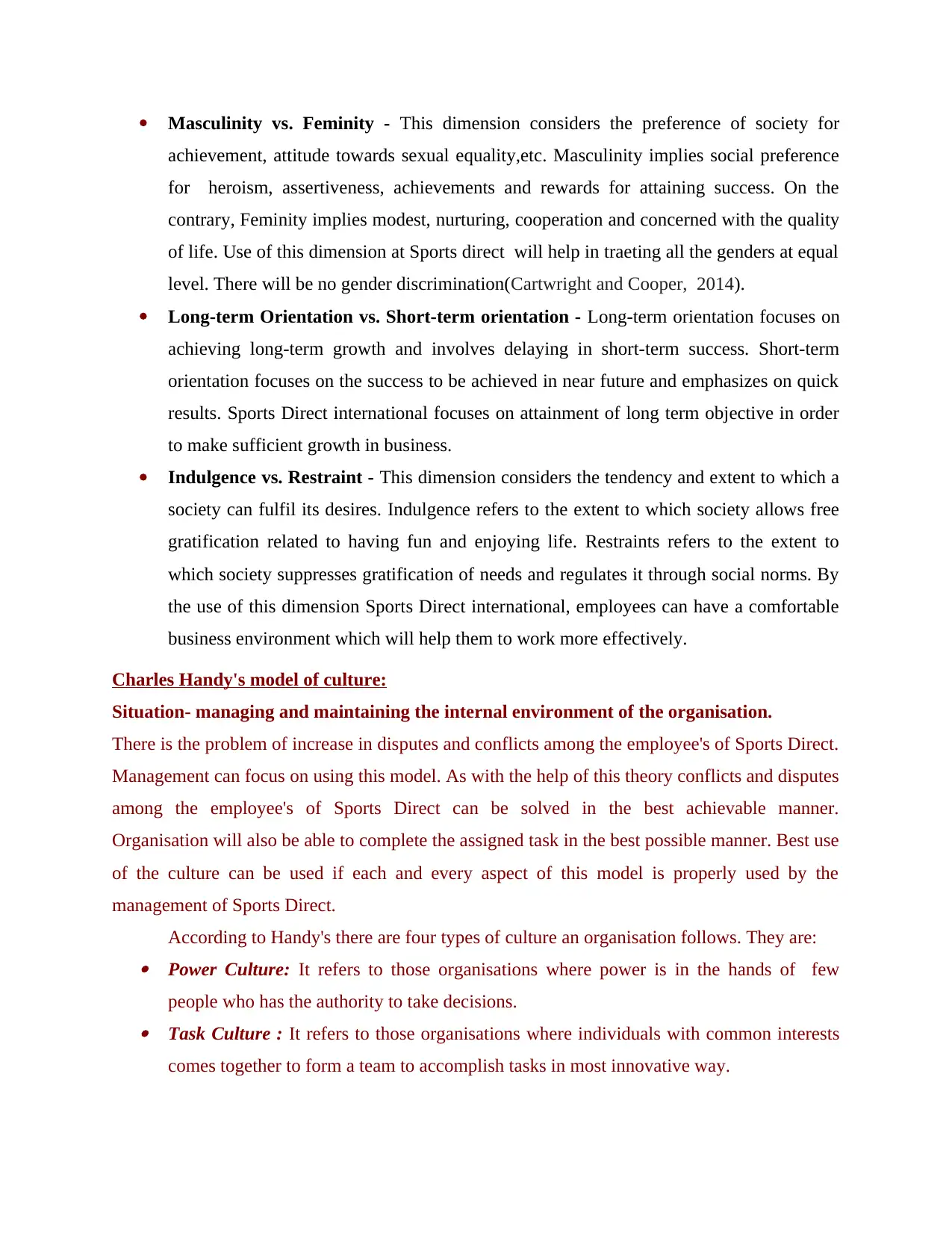
Masculinity vs. Feminity - This dimension considers the preference of society for
achievement, attitude towards sexual equality,etc. Masculinity implies social preference
for heroism, assertiveness, achievements and rewards for attaining success. On the
contrary, Feminity implies modest, nurturing, cooperation and concerned with the quality
of life. Use of this dimension at Sports direct will help in traeting all the genders at equal
level. There will be no gender discrimination(Cartwright and Cooper, 2014).
Long-term Orientation vs. Short-term orientation - Long-term orientation focuses on
achieving long-term growth and involves delaying in short-term success. Short-term
orientation focuses on the success to be achieved in near future and emphasizes on quick
results. Sports Direct international focuses on attainment of long term objective in order
to make sufficient growth in business.
Indulgence vs. Restraint - This dimension considers the tendency and extent to which a
society can fulfil its desires. Indulgence refers to the extent to which society allows free
gratification related to having fun and enjoying life. Restraints refers to the extent to
which society suppresses gratification of needs and regulates it through social norms. By
the use of this dimension Sports Direct international, employees can have a comfortable
business environment which will help them to work more effectively.
Charles Handy's model of culture:
Situation- managing and maintaining the internal environment of the organisation.
There is the problem of increase in disputes and conflicts among the employee's of Sports Direct.
Management can focus on using this model. As with the help of this theory conflicts and disputes
among the employee's of Sports Direct can be solved in the best achievable manner.
Organisation will also be able to complete the assigned task in the best possible manner. Best use
of the culture can be used if each and every aspect of this model is properly used by the
management of Sports Direct.
According to Handy's there are four types of culture an organisation follows. They are: Power Culture: It refers to those organisations where power is in the hands of few
people who has the authority to take decisions. Task Culture : It refers to those organisations where individuals with common interests
comes together to form a team to accomplish tasks in most innovative way.
achievement, attitude towards sexual equality,etc. Masculinity implies social preference
for heroism, assertiveness, achievements and rewards for attaining success. On the
contrary, Feminity implies modest, nurturing, cooperation and concerned with the quality
of life. Use of this dimension at Sports direct will help in traeting all the genders at equal
level. There will be no gender discrimination(Cartwright and Cooper, 2014).
Long-term Orientation vs. Short-term orientation - Long-term orientation focuses on
achieving long-term growth and involves delaying in short-term success. Short-term
orientation focuses on the success to be achieved in near future and emphasizes on quick
results. Sports Direct international focuses on attainment of long term objective in order
to make sufficient growth in business.
Indulgence vs. Restraint - This dimension considers the tendency and extent to which a
society can fulfil its desires. Indulgence refers to the extent to which society allows free
gratification related to having fun and enjoying life. Restraints refers to the extent to
which society suppresses gratification of needs and regulates it through social norms. By
the use of this dimension Sports Direct international, employees can have a comfortable
business environment which will help them to work more effectively.
Charles Handy's model of culture:
Situation- managing and maintaining the internal environment of the organisation.
There is the problem of increase in disputes and conflicts among the employee's of Sports Direct.
Management can focus on using this model. As with the help of this theory conflicts and disputes
among the employee's of Sports Direct can be solved in the best achievable manner.
Organisation will also be able to complete the assigned task in the best possible manner. Best use
of the culture can be used if each and every aspect of this model is properly used by the
management of Sports Direct.
According to Handy's there are four types of culture an organisation follows. They are: Power Culture: It refers to those organisations where power is in the hands of few
people who has the authority to take decisions. Task Culture : It refers to those organisations where individuals with common interests
comes together to form a team to accomplish tasks in most innovative way.
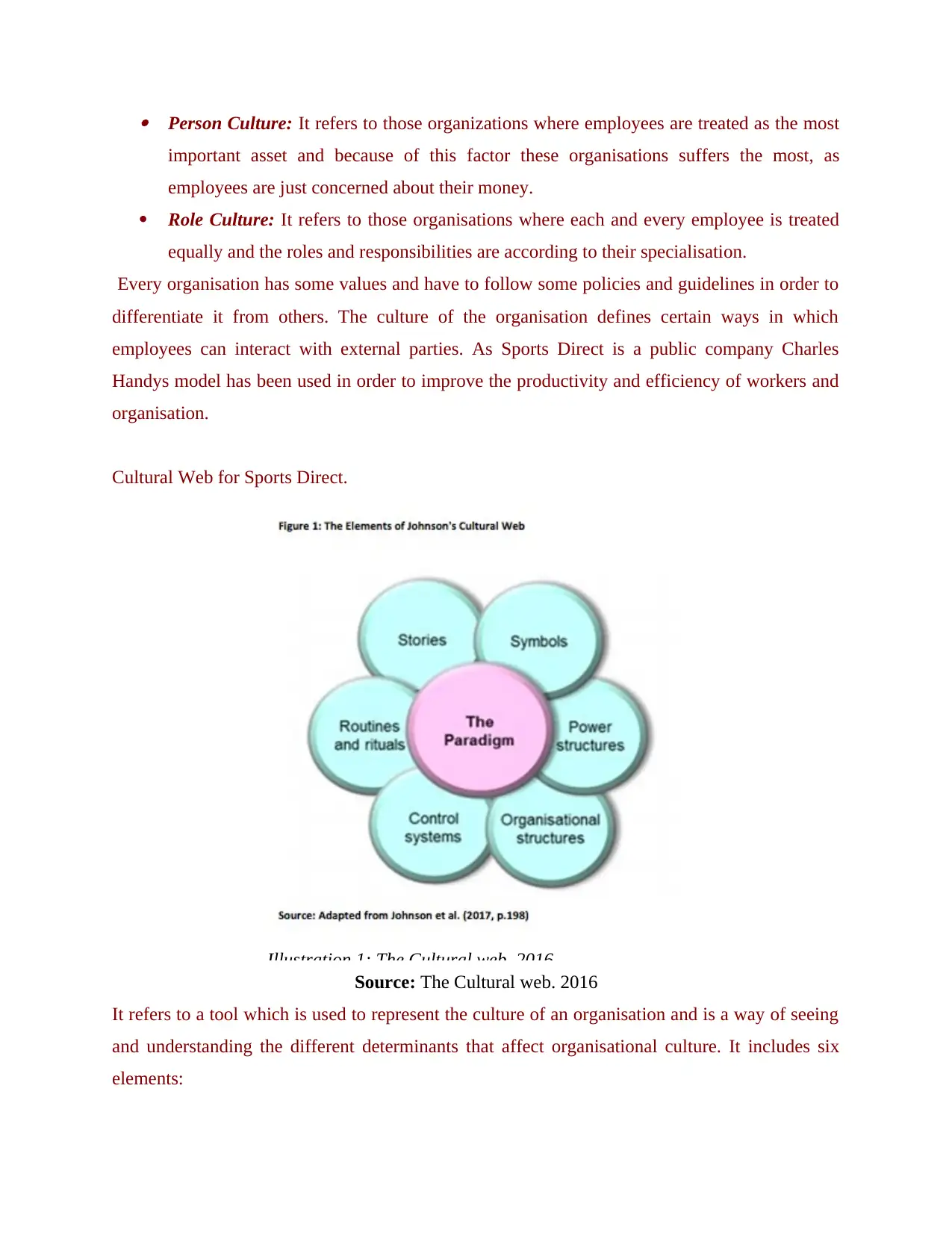
Person Culture: It refers to those organizations where employees are treated as the most
important asset and because of this factor these organisations suffers the most, as
employees are just concerned about their money.
Role Culture: It refers to those organisations where each and every employee is treated
equally and the roles and responsibilities are according to their specialisation.
Every organisation has some values and have to follow some policies and guidelines in order to
differentiate it from others. The culture of the organisation defines certain ways in which
employees can interact with external parties. As Sports Direct is a public company Charles
Handys model has been used in order to improve the productivity and efficiency of workers and
organisation.
Cultural Web for Sports Direct.
Source: The Cultural web. 2016
It refers to a tool which is used to represent the culture of an organisation and is a way of seeing
and understanding the different determinants that affect organisational culture. It includes six
elements:
Illustration 1: The Cultural web. 2016
important asset and because of this factor these organisations suffers the most, as
employees are just concerned about their money.
Role Culture: It refers to those organisations where each and every employee is treated
equally and the roles and responsibilities are according to their specialisation.
Every organisation has some values and have to follow some policies and guidelines in order to
differentiate it from others. The culture of the organisation defines certain ways in which
employees can interact with external parties. As Sports Direct is a public company Charles
Handys model has been used in order to improve the productivity and efficiency of workers and
organisation.
Cultural Web for Sports Direct.
Source: The Cultural web. 2016
It refers to a tool which is used to represent the culture of an organisation and is a way of seeing
and understanding the different determinants that affect organisational culture. It includes six
elements:
Illustration 1: The Cultural web. 2016
⊘ This is a preview!⊘
Do you want full access?
Subscribe today to unlock all pages.

Trusted by 1+ million students worldwide
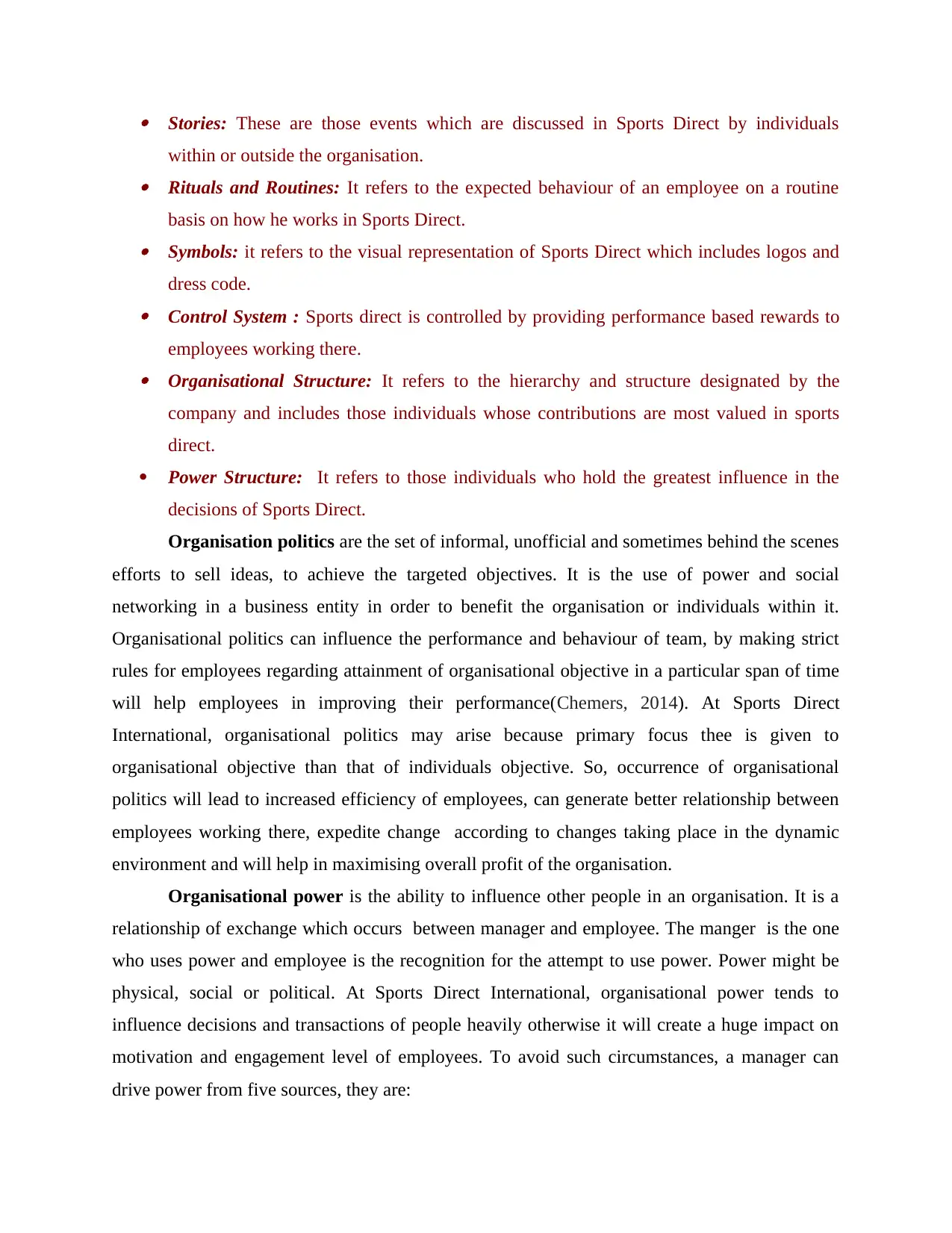
Stories: These are those events which are discussed in Sports Direct by individuals
within or outside the organisation. Rituals and Routines: It refers to the expected behaviour of an employee on a routine
basis on how he works in Sports Direct. Symbols: it refers to the visual representation of Sports Direct which includes logos and
dress code. Control System : Sports direct is controlled by providing performance based rewards to
employees working there. Organisational Structure: It refers to the hierarchy and structure designated by the
company and includes those individuals whose contributions are most valued in sports
direct.
Power Structure: It refers to those individuals who hold the greatest influence in the
decisions of Sports Direct.
Organisation politics are the set of informal, unofficial and sometimes behind the scenes
efforts to sell ideas, to achieve the targeted objectives. It is the use of power and social
networking in a business entity in order to benefit the organisation or individuals within it.
Organisational politics can influence the performance and behaviour of team, by making strict
rules for employees regarding attainment of organisational objective in a particular span of time
will help employees in improving their performance(Chemers, 2014). At Sports Direct
International, organisational politics may arise because primary focus thee is given to
organisational objective than that of individuals objective. So, occurrence of organisational
politics will lead to increased efficiency of employees, can generate better relationship between
employees working there, expedite change according to changes taking place in the dynamic
environment and will help in maximising overall profit of the organisation.
Organisational power is the ability to influence other people in an organisation. It is a
relationship of exchange which occurs between manager and employee. The manger is the one
who uses power and employee is the recognition for the attempt to use power. Power might be
physical, social or political. At Sports Direct International, organisational power tends to
influence decisions and transactions of people heavily otherwise it will create a huge impact on
motivation and engagement level of employees. To avoid such circumstances, a manager can
drive power from five sources, they are:
within or outside the organisation. Rituals and Routines: It refers to the expected behaviour of an employee on a routine
basis on how he works in Sports Direct. Symbols: it refers to the visual representation of Sports Direct which includes logos and
dress code. Control System : Sports direct is controlled by providing performance based rewards to
employees working there. Organisational Structure: It refers to the hierarchy and structure designated by the
company and includes those individuals whose contributions are most valued in sports
direct.
Power Structure: It refers to those individuals who hold the greatest influence in the
decisions of Sports Direct.
Organisation politics are the set of informal, unofficial and sometimes behind the scenes
efforts to sell ideas, to achieve the targeted objectives. It is the use of power and social
networking in a business entity in order to benefit the organisation or individuals within it.
Organisational politics can influence the performance and behaviour of team, by making strict
rules for employees regarding attainment of organisational objective in a particular span of time
will help employees in improving their performance(Chemers, 2014). At Sports Direct
International, organisational politics may arise because primary focus thee is given to
organisational objective than that of individuals objective. So, occurrence of organisational
politics will lead to increased efficiency of employees, can generate better relationship between
employees working there, expedite change according to changes taking place in the dynamic
environment and will help in maximising overall profit of the organisation.
Organisational power is the ability to influence other people in an organisation. It is a
relationship of exchange which occurs between manager and employee. The manger is the one
who uses power and employee is the recognition for the attempt to use power. Power might be
physical, social or political. At Sports Direct International, organisational power tends to
influence decisions and transactions of people heavily otherwise it will create a huge impact on
motivation and engagement level of employees. To avoid such circumstances, a manager can
drive power from five sources, they are:
Paraphrase This Document
Need a fresh take? Get an instant paraphrase of this document with our AI Paraphraser
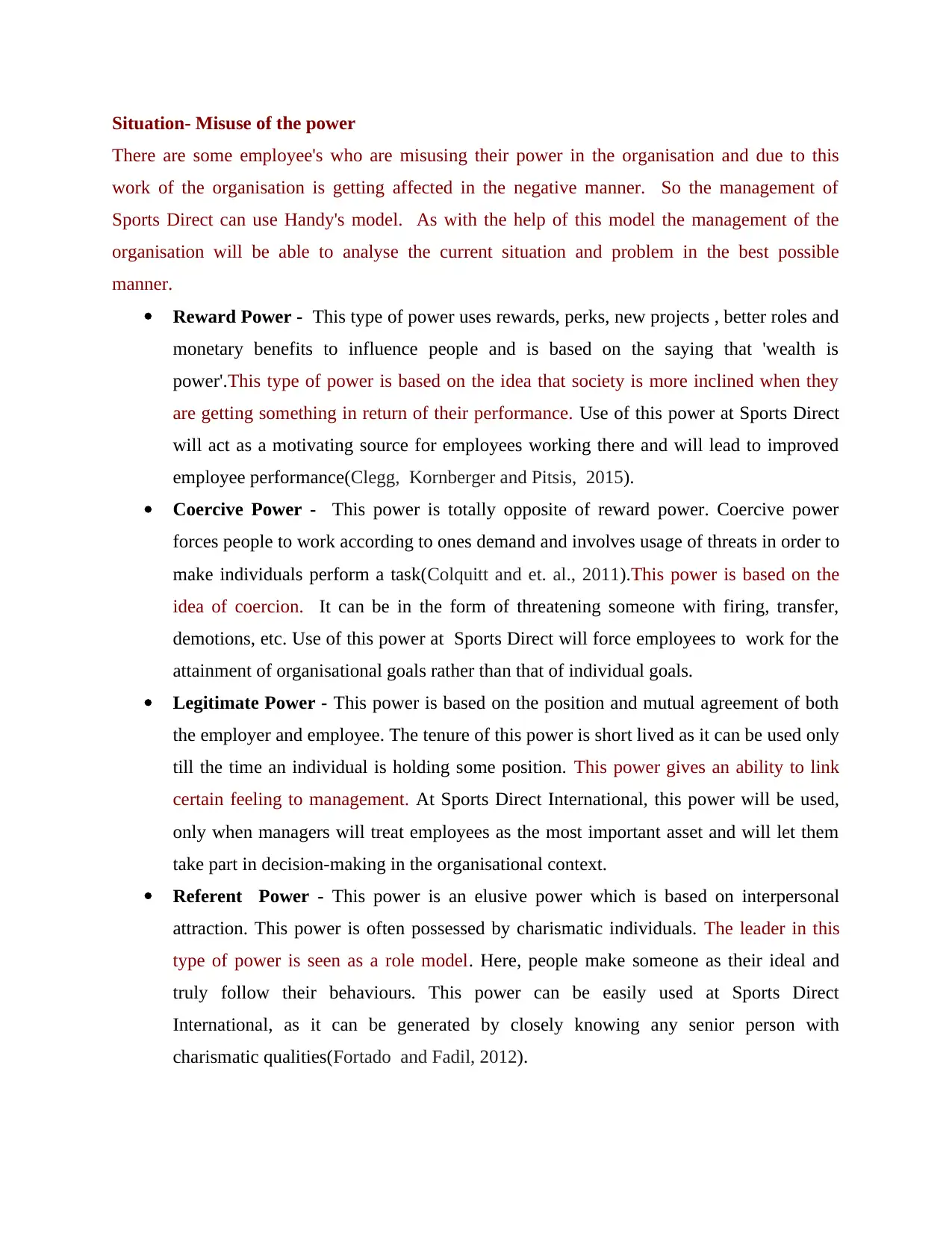
Situation- Misuse of the power
There are some employee's who are misusing their power in the organisation and due to this
work of the organisation is getting affected in the negative manner. So the management of
Sports Direct can use Handy's model. As with the help of this model the management of the
organisation will be able to analyse the current situation and problem in the best possible
manner.
Reward Power - This type of power uses rewards, perks, new projects , better roles and
monetary benefits to influence people and is based on the saying that 'wealth is
power'.This type of power is based on the idea that society is more inclined when they
are getting something in return of their performance. Use of this power at Sports Direct
will act as a motivating source for employees working there and will lead to improved
employee performance(Clegg, Kornberger and Pitsis, 2015).
Coercive Power - This power is totally opposite of reward power. Coercive power
forces people to work according to ones demand and involves usage of threats in order to
make individuals perform a task(Colquitt and et. al., 2011).This power is based on the
idea of coercion. It can be in the form of threatening someone with firing, transfer,
demotions, etc. Use of this power at Sports Direct will force employees to work for the
attainment of organisational goals rather than that of individual goals.
Legitimate Power - This power is based on the position and mutual agreement of both
the employer and employee. The tenure of this power is short lived as it can be used only
till the time an individual is holding some position. This power gives an ability to link
certain feeling to management. At Sports Direct International, this power will be used,
only when managers will treat employees as the most important asset and will let them
take part in decision-making in the organisational context.
Referent Power - This power is an elusive power which is based on interpersonal
attraction. This power is often possessed by charismatic individuals. The leader in this
type of power is seen as a role model. Here, people make someone as their ideal and
truly follow their behaviours. This power can be easily used at Sports Direct
International, as it can be generated by closely knowing any senior person with
charismatic qualities(Fortado and Fadil, 2012).
There are some employee's who are misusing their power in the organisation and due to this
work of the organisation is getting affected in the negative manner. So the management of
Sports Direct can use Handy's model. As with the help of this model the management of the
organisation will be able to analyse the current situation and problem in the best possible
manner.
Reward Power - This type of power uses rewards, perks, new projects , better roles and
monetary benefits to influence people and is based on the saying that 'wealth is
power'.This type of power is based on the idea that society is more inclined when they
are getting something in return of their performance. Use of this power at Sports Direct
will act as a motivating source for employees working there and will lead to improved
employee performance(Clegg, Kornberger and Pitsis, 2015).
Coercive Power - This power is totally opposite of reward power. Coercive power
forces people to work according to ones demand and involves usage of threats in order to
make individuals perform a task(Colquitt and et. al., 2011).This power is based on the
idea of coercion. It can be in the form of threatening someone with firing, transfer,
demotions, etc. Use of this power at Sports Direct will force employees to work for the
attainment of organisational goals rather than that of individual goals.
Legitimate Power - This power is based on the position and mutual agreement of both
the employer and employee. The tenure of this power is short lived as it can be used only
till the time an individual is holding some position. This power gives an ability to link
certain feeling to management. At Sports Direct International, this power will be used,
only when managers will treat employees as the most important asset and will let them
take part in decision-making in the organisational context.
Referent Power - This power is an elusive power which is based on interpersonal
attraction. This power is often possessed by charismatic individuals. The leader in this
type of power is seen as a role model. Here, people make someone as their ideal and
truly follow their behaviours. This power can be easily used at Sports Direct
International, as it can be generated by closely knowing any senior person with
charismatic qualities(Fortado and Fadil, 2012).
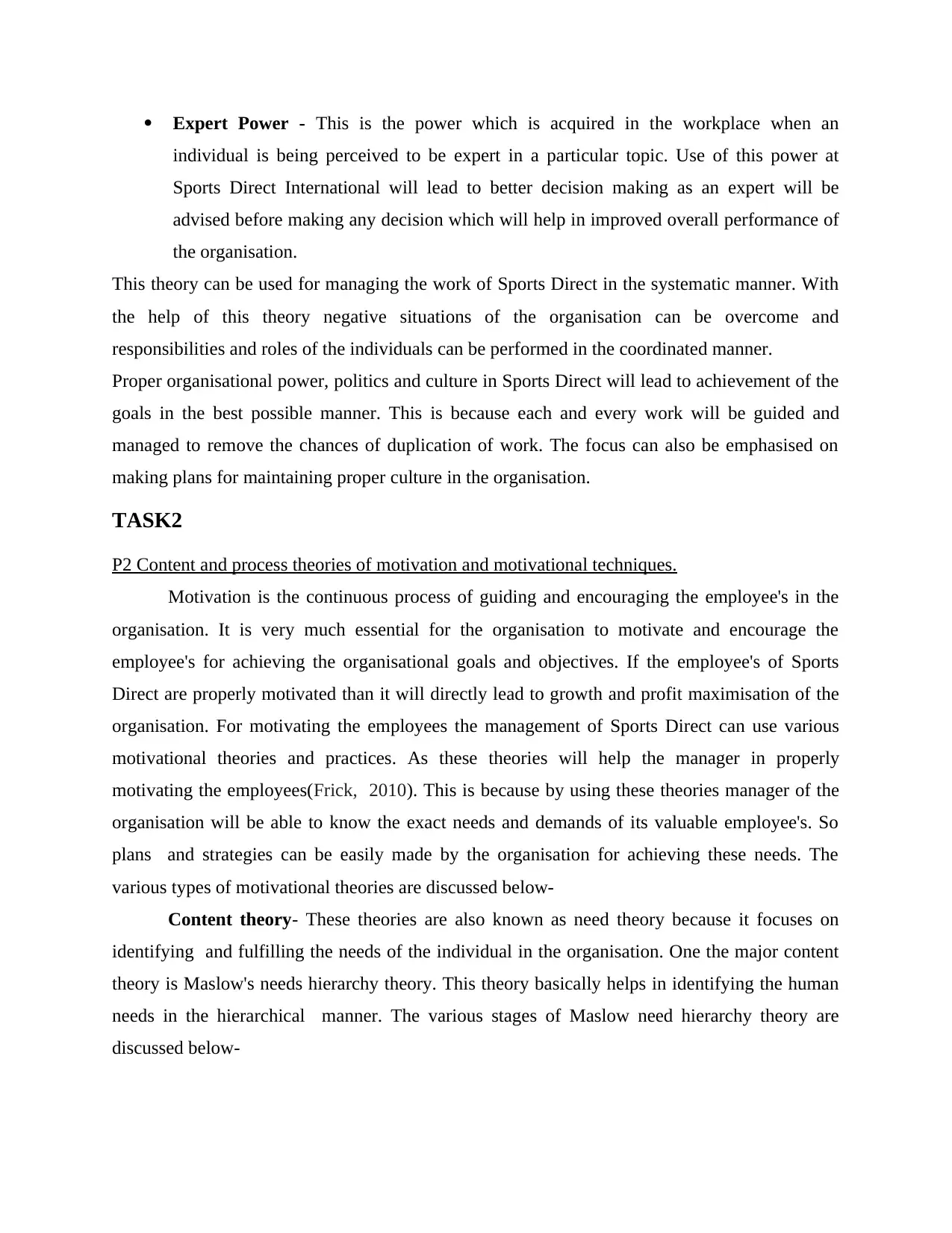
Expert Power - This is the power which is acquired in the workplace when an
individual is being perceived to be expert in a particular topic. Use of this power at
Sports Direct International will lead to better decision making as an expert will be
advised before making any decision which will help in improved overall performance of
the organisation.
This theory can be used for managing the work of Sports Direct in the systematic manner. With
the help of this theory negative situations of the organisation can be overcome and
responsibilities and roles of the individuals can be performed in the coordinated manner.
Proper organisational power, politics and culture in Sports Direct will lead to achievement of the
goals in the best possible manner. This is because each and every work will be guided and
managed to remove the chances of duplication of work. The focus can also be emphasised on
making plans for maintaining proper culture in the organisation.
TASK2
P2 Content and process theories of motivation and motivational techniques.
Motivation is the continuous process of guiding and encouraging the employee's in the
organisation. It is very much essential for the organisation to motivate and encourage the
employee's for achieving the organisational goals and objectives. If the employee's of Sports
Direct are properly motivated than it will directly lead to growth and profit maximisation of the
organisation. For motivating the employees the management of Sports Direct can use various
motivational theories and practices. As these theories will help the manager in properly
motivating the employees(Frick, 2010). This is because by using these theories manager of the
organisation will be able to know the exact needs and demands of its valuable employee's. So
plans and strategies can be easily made by the organisation for achieving these needs. The
various types of motivational theories are discussed below-
Content theory- These theories are also known as need theory because it focuses on
identifying and fulfilling the needs of the individual in the organisation. One the major content
theory is Maslow's needs hierarchy theory. This theory basically helps in identifying the human
needs in the hierarchical manner. The various stages of Maslow need hierarchy theory are
discussed below-
individual is being perceived to be expert in a particular topic. Use of this power at
Sports Direct International will lead to better decision making as an expert will be
advised before making any decision which will help in improved overall performance of
the organisation.
This theory can be used for managing the work of Sports Direct in the systematic manner. With
the help of this theory negative situations of the organisation can be overcome and
responsibilities and roles of the individuals can be performed in the coordinated manner.
Proper organisational power, politics and culture in Sports Direct will lead to achievement of the
goals in the best possible manner. This is because each and every work will be guided and
managed to remove the chances of duplication of work. The focus can also be emphasised on
making plans for maintaining proper culture in the organisation.
TASK2
P2 Content and process theories of motivation and motivational techniques.
Motivation is the continuous process of guiding and encouraging the employee's in the
organisation. It is very much essential for the organisation to motivate and encourage the
employee's for achieving the organisational goals and objectives. If the employee's of Sports
Direct are properly motivated than it will directly lead to growth and profit maximisation of the
organisation. For motivating the employees the management of Sports Direct can use various
motivational theories and practices. As these theories will help the manager in properly
motivating the employees(Frick, 2010). This is because by using these theories manager of the
organisation will be able to know the exact needs and demands of its valuable employee's. So
plans and strategies can be easily made by the organisation for achieving these needs. The
various types of motivational theories are discussed below-
Content theory- These theories are also known as need theory because it focuses on
identifying and fulfilling the needs of the individual in the organisation. One the major content
theory is Maslow's needs hierarchy theory. This theory basically helps in identifying the human
needs in the hierarchical manner. The various stages of Maslow need hierarchy theory are
discussed below-
⊘ This is a preview!⊘
Do you want full access?
Subscribe today to unlock all pages.

Trusted by 1+ million students worldwide
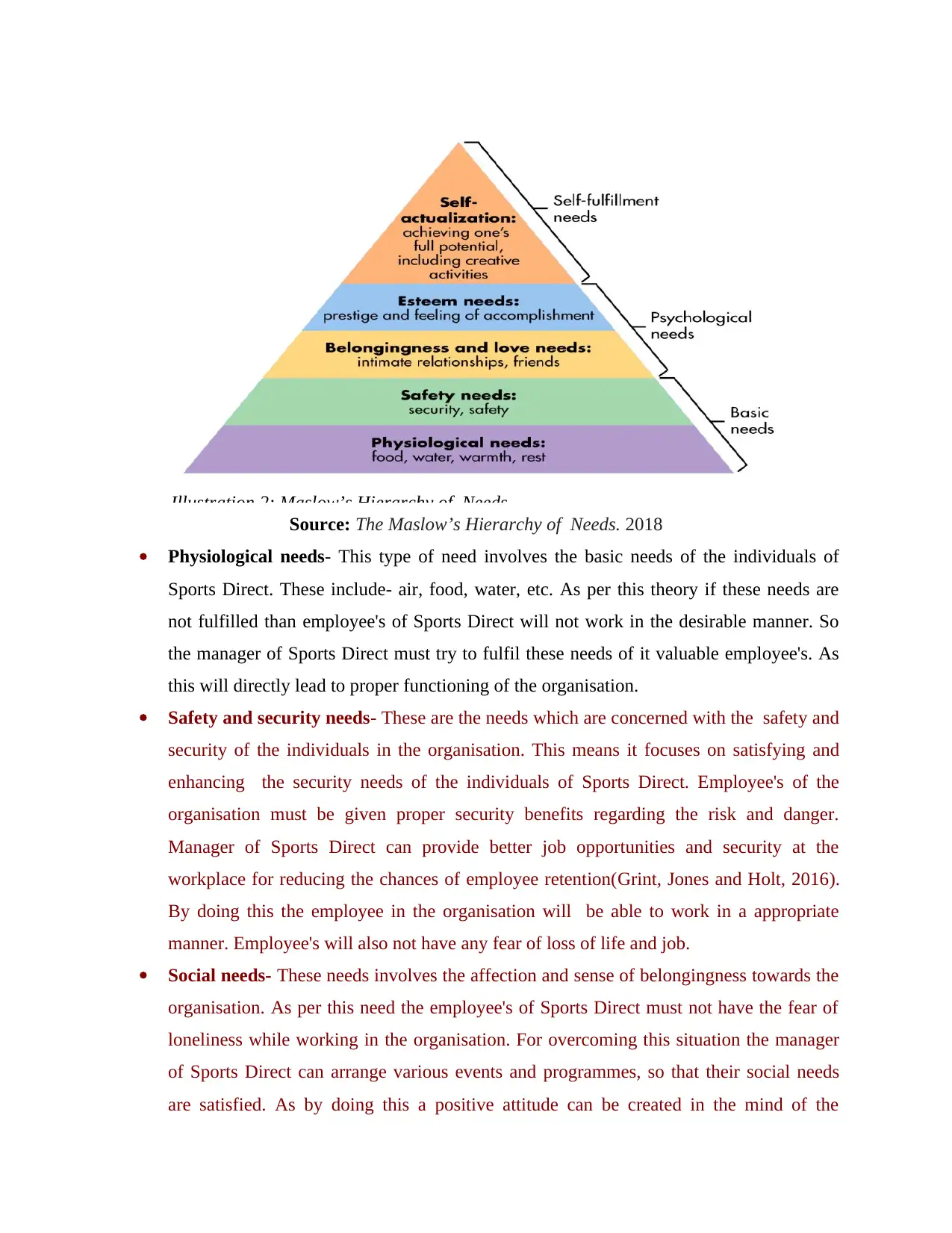
Source: The Maslow’s Hierarchy of Needs. 2018
Physiological needs- This type of need involves the basic needs of the individuals of
Sports Direct. These include- air, food, water, etc. As per this theory if these needs are
not fulfilled than employee's of Sports Direct will not work in the desirable manner. So
the manager of Sports Direct must try to fulfil these needs of it valuable employee's. As
this will directly lead to proper functioning of the organisation.
Safety and security needs- These are the needs which are concerned with the safety and
security of the individuals in the organisation. This means it focuses on satisfying and
enhancing the security needs of the individuals of Sports Direct. Employee's of the
organisation must be given proper security benefits regarding the risk and danger.
Manager of Sports Direct can provide better job opportunities and security at the
workplace for reducing the chances of employee retention(Grint, Jones and Holt, 2016).
By doing this the employee in the organisation will be able to work in a appropriate
manner. Employee's will also not have any fear of loss of life and job.
Social needs- These needs involves the affection and sense of belongingness towards the
organisation. As per this need the employee's of Sports Direct must not have the fear of
loneliness while working in the organisation. For overcoming this situation the manager
of Sports Direct can arrange various events and programmes, so that their social needs
are satisfied. As by doing this a positive attitude can be created in the mind of the
Illustration 2: Maslow’s Hierarchy of Needs
Physiological needs- This type of need involves the basic needs of the individuals of
Sports Direct. These include- air, food, water, etc. As per this theory if these needs are
not fulfilled than employee's of Sports Direct will not work in the desirable manner. So
the manager of Sports Direct must try to fulfil these needs of it valuable employee's. As
this will directly lead to proper functioning of the organisation.
Safety and security needs- These are the needs which are concerned with the safety and
security of the individuals in the organisation. This means it focuses on satisfying and
enhancing the security needs of the individuals of Sports Direct. Employee's of the
organisation must be given proper security benefits regarding the risk and danger.
Manager of Sports Direct can provide better job opportunities and security at the
workplace for reducing the chances of employee retention(Grint, Jones and Holt, 2016).
By doing this the employee in the organisation will be able to work in a appropriate
manner. Employee's will also not have any fear of loss of life and job.
Social needs- These needs involves the affection and sense of belongingness towards the
organisation. As per this need the employee's of Sports Direct must not have the fear of
loneliness while working in the organisation. For overcoming this situation the manager
of Sports Direct can arrange various events and programmes, so that their social needs
are satisfied. As by doing this a positive attitude can be created in the mind of the
Illustration 2: Maslow’s Hierarchy of Needs
Paraphrase This Document
Need a fresh take? Get an instant paraphrase of this document with our AI Paraphraser
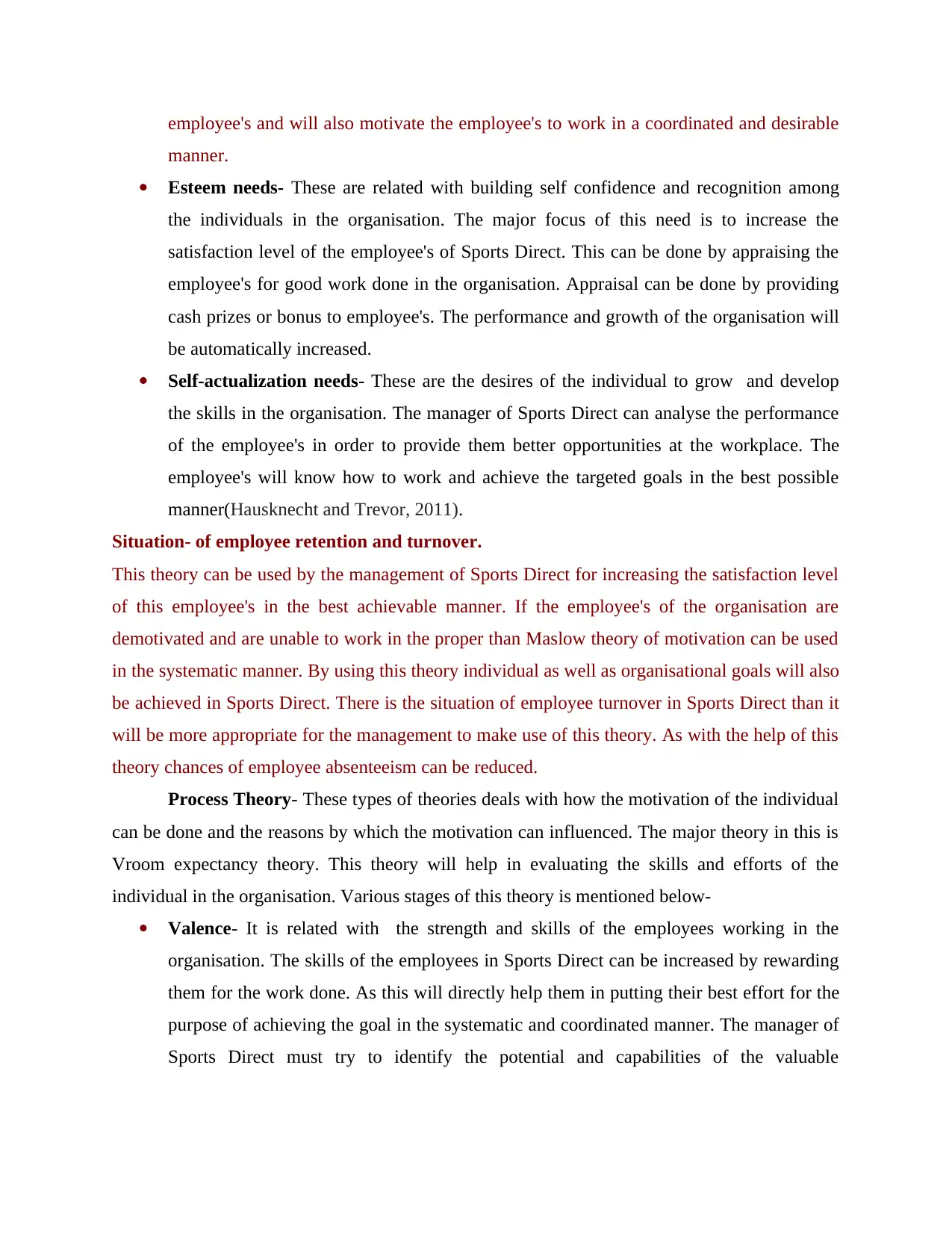
employee's and will also motivate the employee's to work in a coordinated and desirable
manner.
Esteem needs- These are related with building self confidence and recognition among
the individuals in the organisation. The major focus of this need is to increase the
satisfaction level of the employee's of Sports Direct. This can be done by appraising the
employee's for good work done in the organisation. Appraisal can be done by providing
cash prizes or bonus to employee's. The performance and growth of the organisation will
be automatically increased.
Self-actualization needs- These are the desires of the individual to grow and develop
the skills in the organisation. The manager of Sports Direct can analyse the performance
of the employee's in order to provide them better opportunities at the workplace. The
employee's will know how to work and achieve the targeted goals in the best possible
manner(Hausknecht and Trevor, 2011).
Situation- of employee retention and turnover.
This theory can be used by the management of Sports Direct for increasing the satisfaction level
of this employee's in the best achievable manner. If the employee's of the organisation are
demotivated and are unable to work in the proper than Maslow theory of motivation can be used
in the systematic manner. By using this theory individual as well as organisational goals will also
be achieved in Sports Direct. There is the situation of employee turnover in Sports Direct than it
will be more appropriate for the management to make use of this theory. As with the help of this
theory chances of employee absenteeism can be reduced.
Process Theory- These types of theories deals with how the motivation of the individual
can be done and the reasons by which the motivation can influenced. The major theory in this is
Vroom expectancy theory. This theory will help in evaluating the skills and efforts of the
individual in the organisation. Various stages of this theory is mentioned below-
Valence- It is related with the strength and skills of the employees working in the
organisation. The skills of the employees in Sports Direct can be increased by rewarding
them for the work done. As this will directly help them in putting their best effort for the
purpose of achieving the goal in the systematic and coordinated manner. The manager of
Sports Direct must try to identify the potential and capabilities of the valuable
manner.
Esteem needs- These are related with building self confidence and recognition among
the individuals in the organisation. The major focus of this need is to increase the
satisfaction level of the employee's of Sports Direct. This can be done by appraising the
employee's for good work done in the organisation. Appraisal can be done by providing
cash prizes or bonus to employee's. The performance and growth of the organisation will
be automatically increased.
Self-actualization needs- These are the desires of the individual to grow and develop
the skills in the organisation. The manager of Sports Direct can analyse the performance
of the employee's in order to provide them better opportunities at the workplace. The
employee's will know how to work and achieve the targeted goals in the best possible
manner(Hausknecht and Trevor, 2011).
Situation- of employee retention and turnover.
This theory can be used by the management of Sports Direct for increasing the satisfaction level
of this employee's in the best achievable manner. If the employee's of the organisation are
demotivated and are unable to work in the proper than Maslow theory of motivation can be used
in the systematic manner. By using this theory individual as well as organisational goals will also
be achieved in Sports Direct. There is the situation of employee turnover in Sports Direct than it
will be more appropriate for the management to make use of this theory. As with the help of this
theory chances of employee absenteeism can be reduced.
Process Theory- These types of theories deals with how the motivation of the individual
can be done and the reasons by which the motivation can influenced. The major theory in this is
Vroom expectancy theory. This theory will help in evaluating the skills and efforts of the
individual in the organisation. Various stages of this theory is mentioned below-
Valence- It is related with the strength and skills of the employees working in the
organisation. The skills of the employees in Sports Direct can be increased by rewarding
them for the work done. As this will directly help them in putting their best effort for the
purpose of achieving the goal in the systematic and coordinated manner. The manager of
Sports Direct must try to identify the potential and capabilities of the valuable
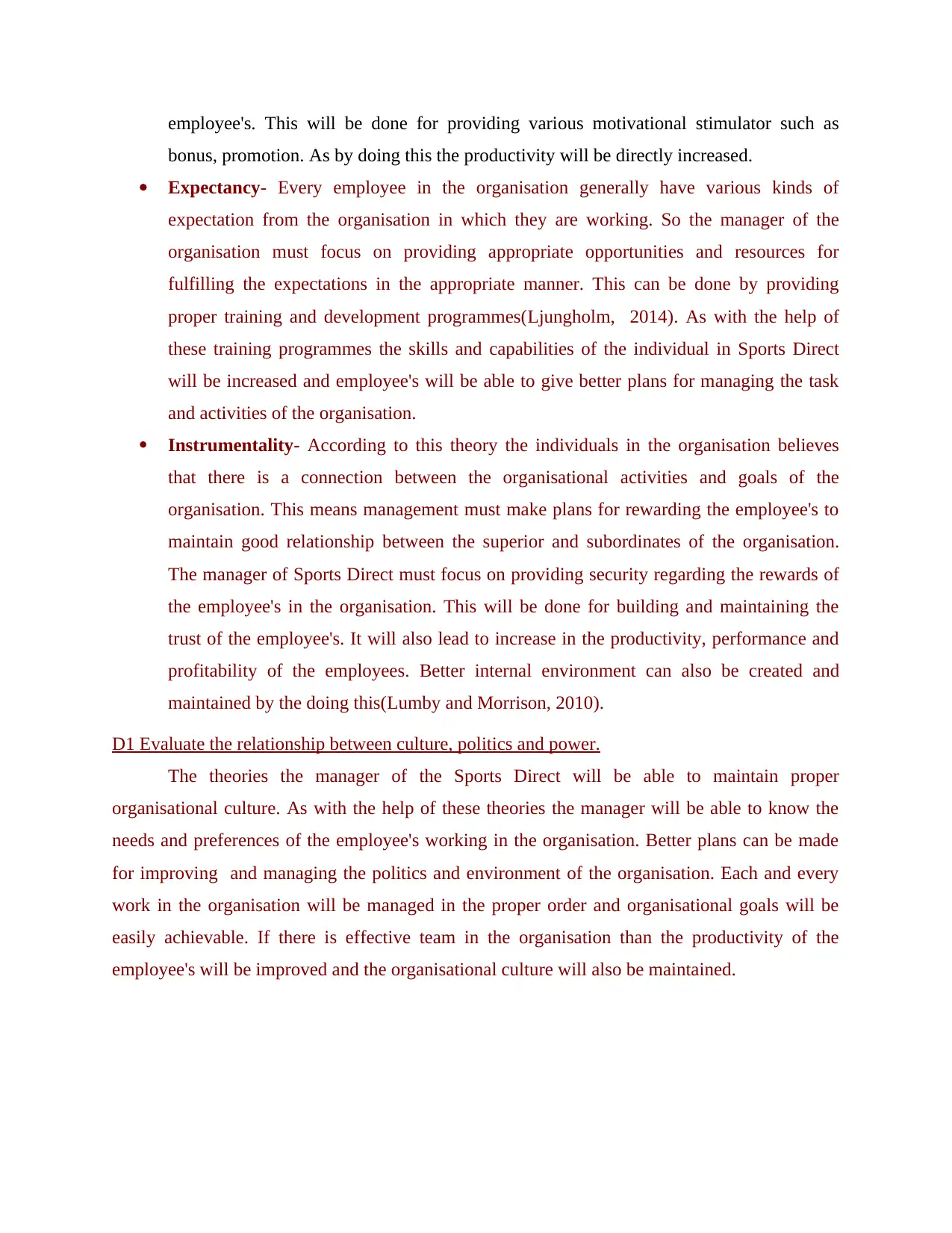
employee's. This will be done for providing various motivational stimulator such as
bonus, promotion. As by doing this the productivity will be directly increased.
Expectancy- Every employee in the organisation generally have various kinds of
expectation from the organisation in which they are working. So the manager of the
organisation must focus on providing appropriate opportunities and resources for
fulfilling the expectations in the appropriate manner. This can be done by providing
proper training and development programmes(Ljungholm, 2014). As with the help of
these training programmes the skills and capabilities of the individual in Sports Direct
will be increased and employee's will be able to give better plans for managing the task
and activities of the organisation.
Instrumentality- According to this theory the individuals in the organisation believes
that there is a connection between the organisational activities and goals of the
organisation. This means management must make plans for rewarding the employee's to
maintain good relationship between the superior and subordinates of the organisation.
The manager of Sports Direct must focus on providing security regarding the rewards of
the employee's in the organisation. This will be done for building and maintaining the
trust of the employee's. It will also lead to increase in the productivity, performance and
profitability of the employees. Better internal environment can also be created and
maintained by the doing this(Lumby and Morrison, 2010).
D1 Evaluate the relationship between culture, politics and power.
The theories the manager of the Sports Direct will be able to maintain proper
organisational culture. As with the help of these theories the manager will be able to know the
needs and preferences of the employee's working in the organisation. Better plans can be made
for improving and managing the politics and environment of the organisation. Each and every
work in the organisation will be managed in the proper order and organisational goals will be
easily achievable. If there is effective team in the organisation than the productivity of the
employee's will be improved and the organisational culture will also be maintained.
bonus, promotion. As by doing this the productivity will be directly increased.
Expectancy- Every employee in the organisation generally have various kinds of
expectation from the organisation in which they are working. So the manager of the
organisation must focus on providing appropriate opportunities and resources for
fulfilling the expectations in the appropriate manner. This can be done by providing
proper training and development programmes(Ljungholm, 2014). As with the help of
these training programmes the skills and capabilities of the individual in Sports Direct
will be increased and employee's will be able to give better plans for managing the task
and activities of the organisation.
Instrumentality- According to this theory the individuals in the organisation believes
that there is a connection between the organisational activities and goals of the
organisation. This means management must make plans for rewarding the employee's to
maintain good relationship between the superior and subordinates of the organisation.
The manager of Sports Direct must focus on providing security regarding the rewards of
the employee's in the organisation. This will be done for building and maintaining the
trust of the employee's. It will also lead to increase in the productivity, performance and
profitability of the employees. Better internal environment can also be created and
maintained by the doing this(Lumby and Morrison, 2010).
D1 Evaluate the relationship between culture, politics and power.
The theories the manager of the Sports Direct will be able to maintain proper
organisational culture. As with the help of these theories the manager will be able to know the
needs and preferences of the employee's working in the organisation. Better plans can be made
for improving and managing the politics and environment of the organisation. Each and every
work in the organisation will be managed in the proper order and organisational goals will be
easily achievable. If there is effective team in the organisation than the productivity of the
employee's will be improved and the organisational culture will also be maintained.
⊘ This is a preview!⊘
Do you want full access?
Subscribe today to unlock all pages.

Trusted by 1+ million students worldwide
1 out of 23
Related Documents
Your All-in-One AI-Powered Toolkit for Academic Success.
+13062052269
info@desklib.com
Available 24*7 on WhatsApp / Email
![[object Object]](/_next/static/media/star-bottom.7253800d.svg)
Unlock your academic potential
Copyright © 2020–2026 A2Z Services. All Rights Reserved. Developed and managed by ZUCOL.



